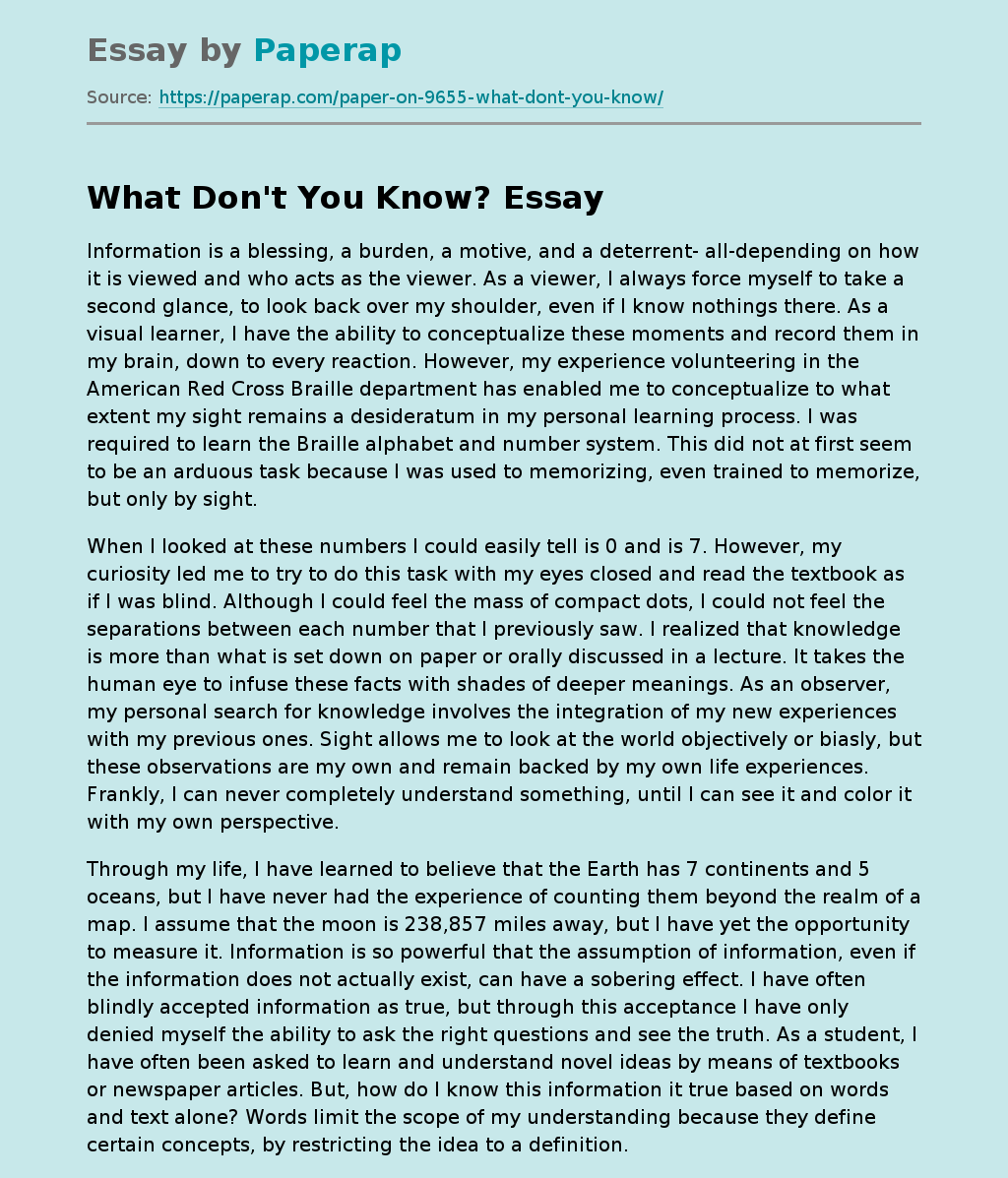What Don't You Know
The following example essay focuses on the topic of information and its value. Read the introduction, body and conclusion of the essay, scroll down.
Information is a blessing, a burden, a motive, and a deterrent- all-depending on how it is viewed and who acts as the viewer. As a viewer, I always force myself to take a second glance, to look back over my shoulder, even if I know nothings there. As a visual learner, I have the ability to conceptualize these moments and record them in my brain, down to every reaction.
However, my experience volunteering in the American Red Cross Braille department has enabled me to conceptualize to what extent my sight remains a desideratum in my personal learning process. I was required to learn the Braille alphabet and number system. This did not at first seem to be an arduous task because I was used to memorizing, even trained to memorize, but only by sight.
When I looked at these numbers I could easily tell is 0 and is 7.
However, my curiosity led me to try to do this task with my eyes closed and read the textbook as if I was blind. Although I could feel the mass of compact dots, I could not feel the separations between each number that I previously saw. I realized that knowledge is more than what is set down on paper or orally discussed in a lecture. It takes the human eye to infuse these facts with shades of deeper meanings. As an observer, my personal search for knowledge involves the integration of my new experiences with my previous ones.
Sight allows me to look at the world objectively or biasly, but these observations are my own and remain backed by my own life experiences. Frankly, I can never completely understand something, until I can see it and color it with my own perspective.
Through my life, I have learned to believe that the Earth has 7 continents and 5 oceans, but I have never had the experience of counting them beyond the realm of a map. I assume that the moon is 238,857 miles away, but I have yet the opportunity to measure it. Information is so powerful that the assumption of information, even if the information does not actually exist, can have a sobering effect. I have often blindly accepted information as true, but through this acceptance I have only denied myself the ability to ask the right questions and see the truth. As a student, I have often been asked to learn and understand novel ideas by means of textbooks or newspaper articles. But, how do I know this information it true based on words and text alone? Words limit the scope of my understanding because they define certain concepts, by restricting the idea to a definition.
The multifaceted aspects of language allow people to explain the source of their knowledge. But consequently, language also inhibits its users, who can be restricted by trying to pinpoint the “right word,” when there might not be one strong or passionate enough to describe the intended meaning. Sight can turn conventional wisdom on its head because it bothers to challenge explanation for many issues that often go unexamined, unquestioned, and not corrected.
For example, I know what love is because I have witnessed it everyday in the warmth of my home and the comforts of my school. Personally, I believe that love is a word that has numerous inaccurate definitions. Regardless, you just can’t pin it down with six or seven meanings. Love transcends meaning. This feeling exists beyond the realm of language, but I know it exists because I see it everyday. It is that feeling in the pit of you stomach that occurs when you see someone you truly care about or even when you see a couple holding hands. However, I do not know what love means to you because I have yet to see the world through your eyes.
What Don't You Know. (2017, Nov 29). Retrieved from https://paperap.com/paper-on-9655-what-dont-you-know/

